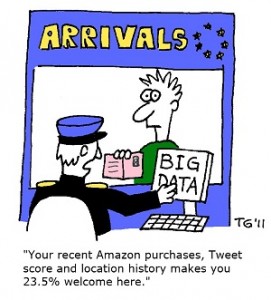The Federal Trade Commission (FTC) held a public workshop, “Big Data: A Tool for Inclusion or Exclusion,” on September 15, where participants acknowledged the many benefits of Big Data, while also recognizing the potential for harm. FTC Chairwoman Edith Ramirez voiced concern about “discrimination by algorithm,” where a system for grouping consumers may be inadvertently or intentionally set up to have a disproportionate or negative affect on certain populations. Yet she also spoke about the great benefits of Big Data analysis, including increasing personalization, minimizing fraud, and actually reducing discrimination. For example, she highlighted a new program in New York City that seeks to combine information about evictions with emergency shelter data in order to reduce the incidence of homelessness by helping social workers direct their resources to those more likely to end up in a shelter. While the workshop shed light on such benefits, there was no clear resolution from the panelists about how to reduce or address the potential risks.
 Chairwoman Ramirez described a three-prong approach to the Big Data landscape moving forward. First, she noted that the FTC will continue to identify areas where the use of Big Data may violate existing law and will continue to bring enforcement actions, as appropriate. She cited as an example the Instant Checkmate, Inc. settlement from this past April, where a data broker sold consumer data without complying with the Fair Credit Reporting Act. See Complaint and Consent Order. Second, the Chairwoman called for a continued analysis of the gaps in the existing law and discussion of how to address them. She did not call for legislation, and the panelists, similarly stayed away from recommending this approach. Rather, the emphasis remained on first obtaining more information and increasing awareness about the potential harmful impact of Big Data, in addition to increasing consumer and business education. Third, Ramirez encouraged businesses to consider the potential risks discussed throughout the workshop as they design their analytical systems in order to prevent any harm before it occurs, similar to privacy by design.
Chairwoman Ramirez described a three-prong approach to the Big Data landscape moving forward. First, she noted that the FTC will continue to identify areas where the use of Big Data may violate existing law and will continue to bring enforcement actions, as appropriate. She cited as an example the Instant Checkmate, Inc. settlement from this past April, where a data broker sold consumer data without complying with the Fair Credit Reporting Act. See Complaint and Consent Order. Second, the Chairwoman called for a continued analysis of the gaps in the existing law and discussion of how to address them. She did not call for legislation, and the panelists, similarly stayed away from recommending this approach. Rather, the emphasis remained on first obtaining more information and increasing awareness about the potential harmful impact of Big Data, in addition to increasing consumer and business education. Third, Ramirez encouraged businesses to consider the potential risks discussed throughout the workshop as they design their analytical systems in order to prevent any harm before it occurs, similar to privacy by design.
Jessica Rich, Director of the Bureau of Consumer Protection, reiterated Chairwoman Ramirez’s steps for moving forward, and emphasized that the “collective challenge is to make sure that technology continues to provide its many benefits and opportunities to consumers while adhering to core consumer protection values and principles.” Rich also recognized that Big Data is “only going to get bigger,” and that the workshop was just the beginning of the discussion.
Feature photo designed by Freepik.com
Side photoby Thlerry Gregorlus from Flickr


